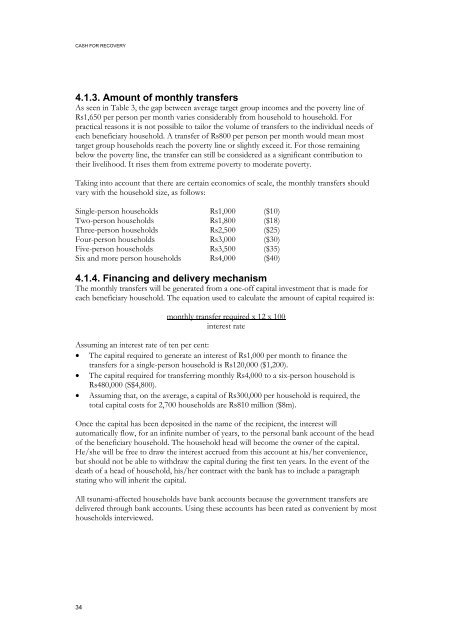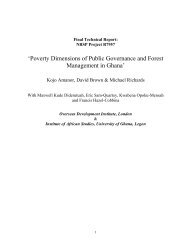Feasibility study on a capital-based income generation scheme for ...
Feasibility study on a capital-based income generation scheme for ...
Feasibility study on a capital-based income generation scheme for ...
You also want an ePaper? Increase the reach of your titles
YUMPU automatically turns print PDFs into web optimized ePapers that Google loves.
CASH FOR RECOVERY<br />
4.1.3. Amount of m<strong>on</strong>thly transfers<br />
As seen in Table 3, the gap between average target group <strong>income</strong>s and the poverty line of<br />
Rs1,650 per pers<strong>on</strong> per m<strong>on</strong>th varies c<strong>on</strong>siderably from household to household. For<br />
practical reas<strong>on</strong>s it is not possible to tailor the volume of transfers to the individual needs of<br />
each beneficiary household. A transfer of Rs800 per pers<strong>on</strong> per m<strong>on</strong>th would mean most<br />
target group households reach the poverty line or slightly exceed it. For those remaining<br />
below the poverty line, the transfer can still be c<strong>on</strong>sidered as a significant c<strong>on</strong>tributi<strong>on</strong> to<br />
their livelihood. It rises them from extreme poverty to moderate poverty.<br />
Taking into account that there are certain ec<strong>on</strong>omics of scale, the m<strong>on</strong>thly transfers should<br />
vary with the household size, as follows:<br />
Single-pers<strong>on</strong> households Rs1,000 ($10)<br />
Two-pers<strong>on</strong> households Rs1,800 ($18)<br />
Three-pers<strong>on</strong> households Rs2,500 ($25)<br />
Four-pers<strong>on</strong> households Rs3,000 ($30)<br />
Five-pers<strong>on</strong> households Rs3,500 ($35)<br />
Six and more pers<strong>on</strong> households Rs4,000 ($40)<br />
4.1.4. Financing and delivery mechanism<br />
The m<strong>on</strong>thly transfers will be generated from a <strong>on</strong>e-off <strong>capital</strong> investment that is made <strong>for</strong><br />
each beneficiary household. The equati<strong>on</strong> used to calculate the amount of <strong>capital</strong> required is:<br />
m<strong>on</strong>thly transfer required x 12 x 100<br />
interest rate<br />
Assuming an interest rate of ten per cent:<br />
• The <strong>capital</strong> required to generate an interest of Rs1,000 per m<strong>on</strong>th to finance the<br />
transfers <strong>for</strong> a single-pers<strong>on</strong> household is Rs120,000 ($1,200).<br />
• The <strong>capital</strong> required <strong>for</strong> transferring m<strong>on</strong>thly Rs4,000 to a six-pers<strong>on</strong> household is<br />
Rs480,000 (S$4,800).<br />
• Assuming that, <strong>on</strong> the average, a <strong>capital</strong> of Rs300,000 per household is required, the<br />
total <strong>capital</strong> costs <strong>for</strong> 2,700 households are Rs810 milli<strong>on</strong> ($8m).<br />
Once the <strong>capital</strong> has been deposited in the name of the recipient, the interest will<br />
automatically flow, <strong>for</strong> an infinite number of years, to the pers<strong>on</strong>al bank account of the head<br />
of the beneficiary household. The household head will become the owner of the <strong>capital</strong>.<br />
He/she will be free to draw the interest accrued from this account at his/her c<strong>on</strong>venience,<br />
but should not be able to withdraw the <strong>capital</strong> during the first ten years. In the event of the<br />
death of a head of household, his/her c<strong>on</strong>tract with the bank has to include a paragraph<br />
stating who will inherit the <strong>capital</strong>.<br />
All tsunami-affected households have bank accounts because the government transfers are<br />
delivered through bank accounts. Using these accounts has been rated as c<strong>on</strong>venient by most<br />
households interviewed.<br />
34
















